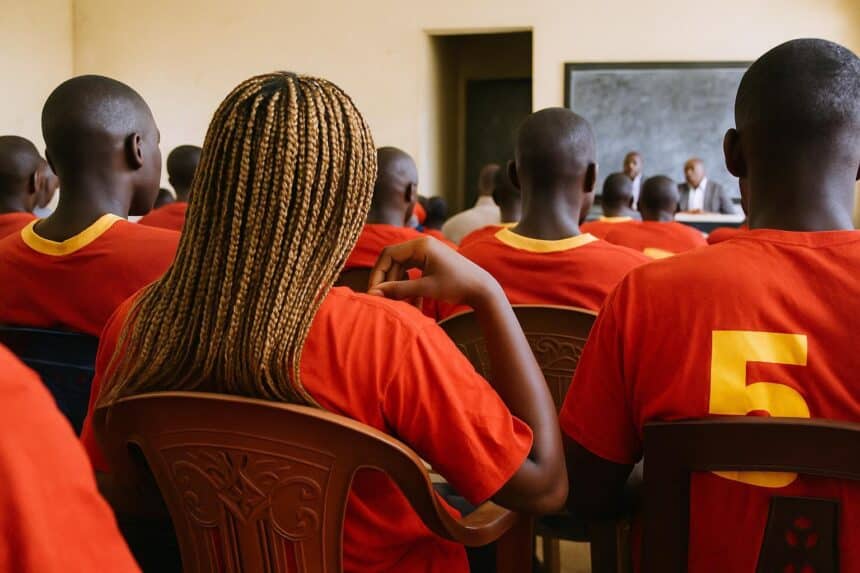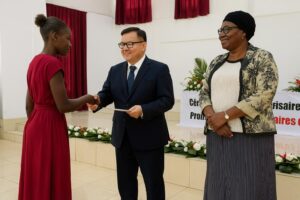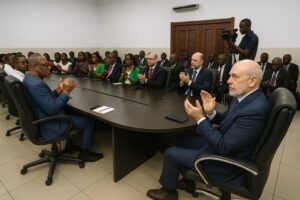Unprecedented exam success behind the walls
Silence fell over the normally bustling courtyard of Brazzaville’s central prison when results for Congo’s June 2025 baccalaureate appeared. Fourteen candidates, studying at makeshift desks under fluorescent lights, heard their names read out. Eleven had passed, an unprecedented success rate that drew cheers from cellmates and wardens alike.
- Unprecedented exam success behind the walls
- Voices of ambition from behind bars
- Penitentiary chief applauds resilience
- Clemency request anchored in national priorities
- Material support to sustain momentum
- Steadily improving numbers since 2017
- Multiple levels, one shared hope
- Parents see a path to redemption
- Legal experts weigh the odds
- University doors ajar, not yet open
- Daily study routine under constraint
- Security balanced with opportunity
- Government’s broader youth agenda
- Religious and civil groups lend a hand
- Economic stakes for society
- Next procedural steps
- Hope tempered with patience
Voices of ambition from behind bars
Fresh certificates still crisp, the successful students delivered a joint appeal to visiting officials on 20 September. “Our dream is to re-enter society and help build tomorrow’s Congo,” one spokesman declared, politely requesting a presidential grace that would let them wp-signup.php at Marien-Ngouabi or Denis-Sassou-Nguesso University.
Penitentiary chief applauds resilience
Colonel-Major Jean Blaise Komo, director-general of the penitentiary administration, personally handed over the documents. “Here, we know the obstacles you overcome daily,” he told the inmates. “Yet you succeeded. This first university diploma opens doors; prepare seriously for the academic year.” His words drew respectful nods from rows of orange uniforms.
Clemency request anchored in national priorities
The detainees underlined that 2024-2025 has been declared the biennium of youth by President Denis Sassou Nguesso. Their plea for freedom, they argued, matches the head of state’s call for young people to seize educational opportunities and drive national development. Observers note the message’s alignment with government policy.
Material support to sustain momentum
To keep the learning flame alive, Colonel-Major Komo delivered new textbooks, notebooks, and pens for the prison’s classroom. He set an ambitious target: 100 percent pass rate next year. “Detention is not a life sentence to ignorance,” he insisted, promising to execute government instructions on social reinsertion to the letter.
Steadily improving numbers since 2017
Prison education in Brazzaville formally began eight years ago, with small groups sitting for state exams each season. According to penitentiary records and coverage by Les Dépêches de Brazzaville, pass rates have climbed steadily. This year’s 99-percent success across CEPE, BEPC and baccalaureate levels is the highest yet recorded.
Multiple levels, one shared hope
Ten out of eleven inmates taking the primary CEPE made the grade. Nine of ten candidates passed the BEPC, closing the gap between lower and upper secondary achievement. Teachers recruited from among retired civil servants now volunteer inside the facility, reinforcing classes once run only by fellow detainees.
Parents see a path to redemption
Outside the gates, families welcomed the certificates as passports to dignity. “People think jail means you are lost,” said Marceline Mabiala, mother of one graduate, to Radio Congo. “Yet education continues here. We thank the government and pray for a pardon so our children can attend campus lectures, not roll-call.”
Legal experts weigh the odds
Jurists note that a presidential grace, distinct from amnesty, can shorten sentences on humanitarian grounds. Me Romuald Ngouala, member of the Brazzaville bar, explains that academic excellence is often viewed favourably when pardon lists are drafted. However, dossiers must still clear security and judicial vetting before reaching the presidential desk.
University doors ajar, not yet open
Marien-Ngouabi University’s vice-chancellor, Prof. Béatrice Mvoula, confirms that enrolment requires proof of freedom or special custody permits. “We champion second chances,” she says, “but attendance demands regular classroom presence.” If clemency is granted, the university can reserve spots in first-year law, economics and engineering programmes traditionally popular among ex-detainees.
Daily study routine under constraint
Inside the prison schoolroom, desks double as bunks at night. Classes run from 08:00 to 14:00, squeezed between roll-calls. Electricity cuts and overcrowding complicate concentration, yet homemade flashcards and peer tutoring offset the hurdles. “Discipline here is strict; that ends up helping revision,” laughs candidate-turned-mentor Longo, serving the final months of his term.
Security balanced with opportunity
Prison officials stress that educational activities adhere to security protocols. Movement to class is escorted, and textbooks are inspected. Colonel-Major Komo argues that schooling reduces tensions and recidivism, echoing findings by the United Nations Office on Drugs and Crime that educated inmates reoffend less and reintegrate faster (UNODC annual report).
Government’s broader youth agenda
The Ministry of Youth, in a recent communiqué, highlighted vocational training, entrepreneurship funds and digital literacy as pillars of the current youth agenda. The penitentiary programme, although specialised, feeds the same objective: equipping young Congolese, wherever they are, to contribute to the national economy once free.
Religious and civil groups lend a hand
Chaplaincies, NGOs such as Action Éducation Prison, and local parishes supply reading materials and cover exam fees. Father Armand Ngatsé, prison chaplain, says donors see education as the most sustainable charity: “A degree cannot be confiscated. It follows the student back to family, factory, or farm.”
Economic stakes for society
Economists estimate that each secondary graduate can add up to 15 percent more lifetime earnings than a peer without the certificate. Applied to even a small cohort of former inmates, the gains compound in lower dependency ratios and higher tax contributions, reinforcing arguments for investment in prison classrooms.
Next procedural steps
Applications for presidential grace are expected to reach the Ministry of Justice before mid-October. Officials will review conduct reports, sentence balance and victim consent where relevant. If approved, beneficiaries could be free by December, just in time for university registration, which officially closes on 31 December.
Hope tempered with patience
For now, the new baccalaureate holders return to their cells each evening, diplomas carefully folded under mattresses. “We study constitutional law around the same walls that once confined us,” says candidate Dieudonné Okemba. “One day we hope to walk through campus gates with the same quiet determination.”






















